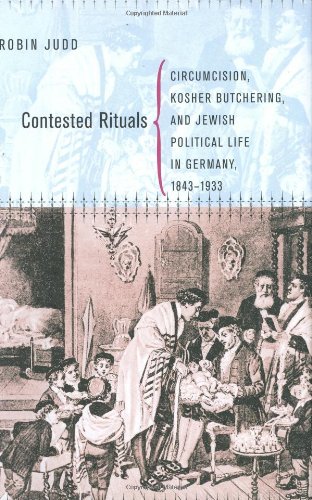

Most ebook files are in PDF format, so you can easily read them using various software such as Foxit Reader or directly on the Google Chrome browser.
Some ebook files are released by publishers in other formats such as .awz, .mobi, .epub, .fb2, etc. You may need to install specific software to read these formats on mobile/PC, such as Calibre.
Please read the tutorial at this link. https://ebooknice.com/page/post?id=faq
We offer FREE conversion to the popular formats you request; however, this may take some time. Therefore, right after payment, please email us, and we will try to provide the service as quickly as possible.
For some exceptional file formats or broken links (if any), please refrain from opening any disputes. Instead, email us first, and we will try to assist within a maximum of 6 hours.
EbookNice Team

Status:
Available4.8
21 reviewsIn Contested Rituals, Robin Judd shows that circumcision and kosher butchering became focal points of political struggle among the German state, its municipal governments, Jews, and Gentiles. In 1843, some German-Jewish fathers refused to circumcise their sons, prompting their Jewish communities to reconsider their standards for membership. Nearly a century later, in 1933, another blood ritual, kosher butchering, served as a political and cultural touchstone when the Nazis built upon a decades-old controversy concerning the practice and prohibited it.
In describing these events and related controversies that raged during the intervening years, Judd explores the nature and escalation of the ritual debates as they transcended the boundaries of the local Jewish community to include non-Jews who sought to protect, restrict, or prohibit these rites. Judd argues that the ritual debates grew out of broad shifts in German politics: the competition between local and regional authority following unification, the possibility of government intervention in private affairs, the place of religious difference in the modern age, and the relationship of the German state to its religious and ethnic minorities, including Catholics. Anti-Semitism was only one factor driving the debates and it often functioned in unexpected ways. Judd gives us a new understanding of the formation of German political systems, the importance of religious practices to Jewish political leadership, the interaction of Jews with the German government, and the reaction of Germans of all faiths to political change.